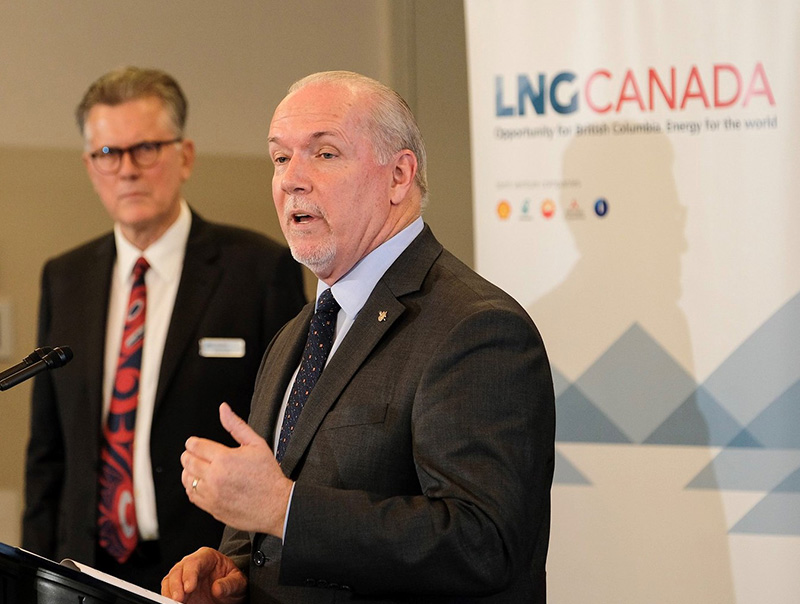Methane emissions from natural gas fracking in B.C. are about double what the government has assumed, according to a recent study initiated by the province and the BC Oil and Gas Commission.
The discrepancy comes from the method used to detect emissions, say the report’s authors. While the government and industry-led emissions studies typically gas imaging cameras to detect methane, the paper echoes a growing body of research challenging the method.
“Recent studies have shown that [optical gas imaging] cameras may not be as effective as originally thought,” wrote the study’s authors.
In the first public study of its kind, researchers used aerial methane measurements — captured by flying over fracking sites and production facilities — to get a clearer picture of their climate impacts. They found significantly higher emissions from sites like production tanks, compressors and unlit gas flares than those being reported.
“This is rigorous research that the government and industry can’t deny because they’ve been involved in it,” said Tom Green, climate solutions policy analyst at the David Suzuki Foundation. “So now we have a much better handle on what those emissions are, and how that’s a problem.”
The research was supported by the BC Oil and Gas Methane Emissions Research Collaborative, a joint collaboration between industry, government non-profits and the Oil and Gas Commission, to support B.C.'s emission targets.
The findings have consequences for the climate — particularly given B.C.’s plan to more than triple its fracking activity by 2040 if the LNG Canada project comes online.
“It’s a huge problem, especially since the province is hell-bent on producing fracked gas, which is essentially methane,” says Green. “Actually the problem is worse than we think and we’re building more of it.”
In an email to The Tyee, the BC Oil and Gas Commission said the latest study compares estimates made three years apart that included different potential sources of emissions. “Despite the challenges outlined with comparing the two survey methods, the conclusion that emission sources are likely higher than previously reported, is consistent with findings in other recent studies,” the commission acknowledged.
In 2020, B.C. set a target to reduce greenhouse gases to 40 per cent below 2007 levels by 2030. By 2050, they committed to an 80 per cent decrease.
In a recent report, veteran energy sector analyst David Hughes found that even with current federal data, natural gas production was likely to blow past those targets.
Even without the added emissions from LNG Canada, Hughes found that natural gas production in the province would exceed B.C.’s 2050 climate target by 54 per cent — and that’s assuming the (unlikely) prospect that all other sectors reduced their emissions to zero.
In a statement from the Ministry of Environment and Climate Change Strategy, the province said they would be considering the study’s impacts in future climate policies.
“Our government will consider the latest information on methane emissions as we develop our detailed roadmap to meet our 2030 emissions targets, which will be released later this year.”
The study further challenges industry and government claims that exporting LNG can lower emissions by helping the world transition off of coal.
Hughes said those arguments don’t match our understanding of methane, which is 86 times more potent than C02 for the first 20 years it’s in the atmosphere. In 100 years, methane may be better than the most efficient and least polluting coal plants. But not in the next 20 years — those most critical to avoiding runaway climate change, Hughes explained. “B.C. LNG makes things worse in the short term,” he said.
Now the study’s findings make that margin of benefit even thinner, says Green. “Natural gas is not a climate solution at all, it’s got a much bigger climate footprint than we thought.”
Canada joined the U.S. and Mexico in 2016 by pledging to reduce methane emissions 40 to 45 per cent below 2012 levels by 2025.
In 2020, B.C. put in regulations to meet that 45 per cent target, requiring companies to reduce emissions at various stages in the production process of natural gas.
Environment Canada’s latest estimate suggests that federal regulations will only lead to methane reductions of around 29 per cent.
“The timing of this is important,” said Jan Gorski, a senior analyst at the Pembina Institute and participant in the Methane Emissions Research Collaborative involved in the study, pointing out that B.C., Alberta and the federal government will initiate reviews on methane regulation in the next year.
“If methane emissions are higher than what we expect, it means it's more urgent that we address that issue correctly and make sure that we are on track to meet government targets to address methane.”
In a statement, the province said it is “working to reduce all greenhouse gas emissions across sectors, including methane emissions from industry,” adding that the study was completed before those regulations were put in place.
The province added that new methane regulations could reduce or avoid nearly 11 million tonnes of CO2-equivalent over 10 years.
Those reductions are worthwhile, said Green, particularly given methane’s potency in the short term, but he cautions against using efficiency measures to justify new fossil fuel infrastructure like LNG plants.
“The IEA [International Energy Agency]'s 1.5 report was very clear. We shouldn’t be expanding anything. We shouldn’t be developing any new fields,” he said. “We should shut down LNG Canada tomorrow. That’s the responsible thing to do.”
The study is a critical intervention in our understanding of B.C.’s share of methane pollution, says Green. Typically, governments rely on standardized factors to calculate average emissions based on previous assumptions.
But Green says those assumptions don’t match up with what’s being found in the atmosphere.
“Satellite measurements and the level of methane in the atmosphere shows that it's going up more quickly than it should be,” he said. “So here's the smoking gun.”
The Ministry of Environment and Climate Change Strategy said the province was, “Working with the federal government to support efforts to improve the official greenhouse gas inventory by incorporating this new data, and will be engaged in any potential discussions about equivalency agreements on methane regulations, should that be required in the future.” ![]()
Read more: Energy, BC Politics, Environment
















Tyee Commenting Guidelines
Comments that violate guidelines risk being deleted, and violations may result in a temporary or permanent user ban. Maintain the spirit of good conversation to stay in the discussion and be patient with moderators. Comments are reviewed regularly but not in real time.
Do:
Do not: